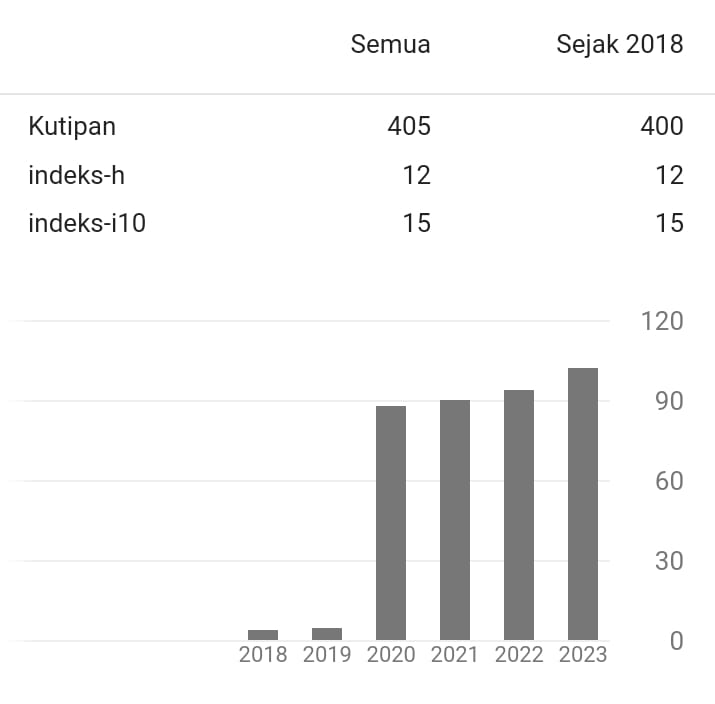THE INFLUENCE OF KWL LEARNING METHODS (KNOW, WANT, LEARN) AND INTEREST IN READING ON READING COMPREHENSION LEARNING OUTCOMES
DOI:
https://doi.org/10.51499/cp.v7i2.550Keywords:
reading comprehension, reading interest, KWLAbstract
This research aims to investigate the impact of the Know, Want To Know, Learned (KWL) learning method and students' interest in reading on the learning outcomes of reading comprehension in VIII class of MTs Daar el-Qolam IV. The study is motivated by the low English language learning outcomes in the understanding concept and the lack of reading interest among students. Therefore, the researcher implements the KWL model to address the challenges faced by the students. The method employed in this research is an experiment with a 2x2 treatment by level design. The population consists of all VIII students of MTs Daar el-Qolam IV, totaling 191 students. The sample was taken using the simple random sampling technique, comprising 76 students divided into two groups; the experimental class (A1) being class VIII-B with 36 students, and the control class (A2) being class VIII-C with 40 students. The research findings indicate that (1) the KWL model is more effective when used by students compared to the conventional method commonly used, namely the Think Pair Share (TPS) method. (2) Additionally, the results also demonstrate that students with a high interest in reading have higher learning outcomes compared to students with low reading interest. (3) There is an interaction between students who undergo the learning process using the KWL method and students using the TPS learning method. (4) Students with high reading interest in the KWL group have higher reading comprehension learning outcomes compared to students in the TPS group, even though they both have high reading interest. And (5) Students in the KWL group with low reading interest also have high reading comprehension learning outcomes compared to students in the TPS group with low reading interest.
Downloads
References
Aremu, A., Alabi, J. O., & Adelani, D. I. (2023). YORC: Yoruba Reading Comprehension dataset. ArXiv Preprint ArXiv:2308.09768.
Arif Nugraha, R., & Dewi, R. (2022). Improving Reading Skills Using The Quick Reading Method In Learning Indonesian Language Short Story Reading Materials Class III at SDN Bandung II. Cakrawala Pedagogik, 6(2), 99–108.
Fikriyyah, M., & Aini, S. N. (2023). The Use of K-W-L ( Know-Want-Learn ) Strategy To Improve Students ’ Reading Ability In Recount Text, (1986), 266–271.
Flynn, R. J., Marquis, R. A., Paquet, M. P., Peeke, L. M., & Aubry, T. D. (2012). Effects of individual direct-instruction tutoring on foster children’s academic skills: A randomized trial. Children and Youth Services Review, 34(6), 1183–1189. https://doi.org/10.1016/j.childyouth.2012.01.036
Katemba, C. V, & Sihombing, N. M. (2023). Enhancing Students’ Reading Comprehension through Venn Diagram Strategy and KWL (Know, Want, Learn) Strategy. Acuity: Journal of English Language Pedagogy, Literature and Culture, 8(1), 87–100. https://doi.org/10.35974/acuity.v8i1.3015
Liu, Q., Mao, R., Geng, X., & Cambria, E. (2023). Semantic matching in machine reading comprehension: An empirical study. Information Processing and Management, 60(2), 103145. https://doi.org/10.1016/j.ipm.2022.103145
Megananda, A. E. W. C., & Dwijayanti, R. (2023). Pengaruh Perbaikan Pelayanan Perpustakaan Dalam Peningkatan Minat Baca Siswa-Siswi Di SMP Kartini Taman. Jurnal Suara Pengabdian, 2(2), 9–20.
Mogea, T. (2023). Improving Students’s Reading Comprehension Through Group Discussion Technique. Jurnal Pendidikan Dan Sastra Inggris, 3(1), 2827–8860.
Naluk, L. M. A., Lohmay, I., Nalle, A. P., & Saba, K. R. (2023). Penerapan Konseling Kelompok untuk Meningkatkan Minat Membaca Siswa Kelas VIII SMP Negeri 12 Kota Kupang. Jurnal Bimbingan Konseling Flobamora, 1(1), 1–8. https://doi.org/10.35508/jbkf.v1i1.10349
Rodiyah, R. (2021). Implementasi Program Merdeka Belajar Kampus Merdeka di Era Digital dalam Menciptakan Karakter Mahasiswa Hukum yang Berkarakter dan Profesional. Jurnal Nasional Hukum, 7(2), 425–434.
Simatupang, E., & Yuhertiana, I. (2021). Merdeka Belajar Kampus Merdeka terhadap Perubahan Paradigma Pembelajaran pada Pendidikan Tinggi: Sebuah Tinjauan Literatur. Jurnal Bisnis, Manajemen, Dan Ekonomi, 2(2), 30–38. https://doi.org/10.47747/jbme.v2i2.230
Wiwin Suciati, & Hastini, H. (2023). The Role of the KWL (Know-Want-Learned) Strategy in Fostering Reading Comprehension: A Case Study at MAN 1 Parigi, Indonesia. Journal of General Education and Humanities, 2(3), 227–236. https://doi.org/10.58421/gehu.v2i3.150
Downloads
Published
How to Cite
Issue
Section
License
Copyright (c) 2023 Ahmad Harismawan Muhtarif, Suherman, Luluk Asmawati

This work is licensed under a Creative Commons Attribution 4.0 International License.
COPYRIGHT NOTICE

This work is licensed under a Creative Commons Attribution 4.0 International License.







